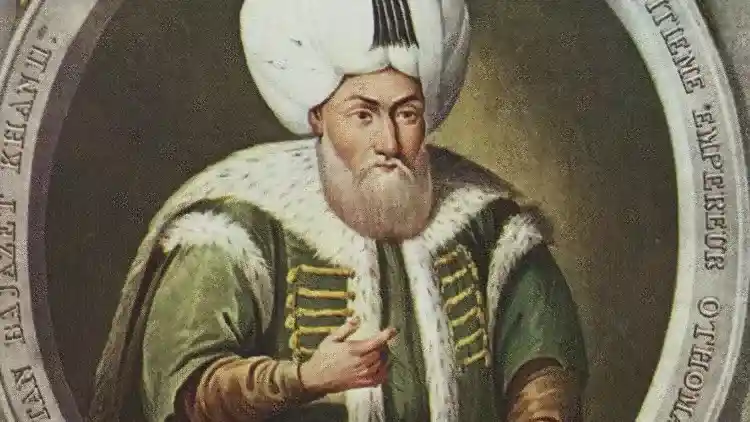Osmanlı İmparatorluğu’nun sekizinci padişahı olan II. Bayezid, 1481-1512 yılları arasında tahtta bulunmuş ve döneminde barışçıl politikaları ile tanınmıştır. Babası Fatih Sultan Mehmed’in ardından tahta çıkan II. Bayezid, iç isyanları bastırmış, devleti yeniden istikrara kavuşturmuş ve ekonomik reformlar yapmıştır. Adalet ve barışa olan bağlılığı nedeniyle tarihçiler tarafından "Veli" unvanıyla anılan II. Bayezid, Osmanlı tarihindeki önemli bir döneme damga vurmuştur. Şimdi, onun hayatını detaylı şekilde inceleyelim.
II. Bayezid, also known as Bayezid the Pious, was the eighth Sultan of the Ottoman Empire, reigning from 1481 to 1512. Born on December 3, 1447, in Demotika, he was the eldest son of Fatih Sultan Mehmed and Gülbahar Hatun. His rule is characterized by relative peace, administrative reforms, and cultural advancements. Despite facing significant challenges, including a succession struggle with his brother Cem Sultan, II. Bayezid maintained stability and strengthened the Ottoman state.
Early Life and Background
Birth and Heritage
II. Bayezid was born into a lineage of powerful and ambitious rulers. His father, Fatih Sultan Mehmed, was renowned for his conquest of Constantinople, while his mother, Gülbahar Hatun, came from a noble Anatolian family. This heritage instilled in Bayezid a deep sense of duty and leadership.
Education and Training
Like all Ottoman princes, Bayezid received a comprehensive education that included Islamic jurisprudence, governance, military strategy, and the arts. Fluent in multiple languages, he was also a poet, writing under the pen name "Adli."
Role as a Governor
Before ascending the throne, Bayezid served as governor of Amasya, a key region for Ottoman princes to gain experience in administration and military leadership. This period honed his skills and prepared him for the responsibilities of ruling an empire.
Relationship with Fatih Sultan Mehmed
Bayezid had a complex relationship with his father, who was known for his strict and ambitious nature. While Fatih's vision focused on expansion, Bayezid leaned towards stability and consolidation.
Accession to the Throne
Following the death of Fatih Sultan Mehmed in 1481, II. Bayezid ascended the throne amidst a succession crisis, facing opposition from his younger brother, Cem Sultan.
The Reign of II. Bayezid
Succession Struggle with Cem Sultan
One of the defining challenges of Bayezid’s early reign was his conflict with Cem Sultan, who sought support from European powers to claim the throne. Bayezid’s diplomatic strategies ensured his victory and secured his rule.
Administrative Reforms
II. Bayezid focused on strengthening the empire’s administrative structures. He streamlined tax systems, improved infrastructure, and promoted fair governance, earning him the title “the Pious.”
Cultural and Scientific Advancements
Under Bayezid’s patronage, the Ottoman Empire experienced a cultural renaissance. He supported scholars, poets, and artists, fostering an environment of intellectual and artistic growth.
Economic Stability
Bayezid implemented economic reforms that revitalized trade and agriculture. His policies ensured a steady flow of revenue, enabling the empire to maintain its military and administrative systems.
Religious Devotion
A devout Muslim, Bayezid commissioned numerous mosques and religious institutions. His reign emphasized justice, piety, and the importance of faith in governance.
Challenges and Conflicts
Rivalries with European Powers
During his reign, II. Bayezid faced challenges from European states, particularly Venice and Hungary. His diplomatic and military strategies maintained Ottoman dominance in the region.
Internal Revolts
Bayezid dealt with several internal revolts, including uprisings in Anatolia. His ability to suppress these rebellions ensured the stability of his rule.
Strained Relations with Selim I
Towards the end of his reign, Bayezid faced opposition from his son Selim, who demanded a more aggressive approach to governance. This conflict eventually led to Bayezid’s abdication in 1512.
The Role of Religion in Politics
Bayezid’s emphasis on religious values influenced his political decisions, sometimes creating tension with factions advocating for expansionist policies.
Legacy of Peaceful Governance
Despite these challenges, Bayezid is remembered for his dedication to peace and stability, which allowed the empire to flourish culturally and economically.
Legacy and Death
Cultural Contributions
Bayezid’s patronage of art and architecture left a lasting legacy. Notable projects include the construction of the Bayezid Mosque in Istanbul.
Diplomatic Achievements
Bayezid’s diplomatic efforts maintained peace with neighboring states, ensuring the empire’s continued prosperity.
Impact on Ottoman Governance
His administrative reforms strengthened the central authority and provided a stable foundation for future rulers.
Death and Abdication
In 1512, Bayezid abdicated in favor of his son, Selim I, and retired to Demotika, where he passed away shortly thereafter. His death marked the end of an era of relative peace in the Ottoman Empire.
Historians’ Perspective
Historians view II. Bayezid as a stabilizing force in Ottoman history, whose reign prioritized internal development over external conquest.
Iı. Bayezid İngilizce Biyografisi
"II. Bayezid Biyografisi" başlığı altında, Osmanlı İmparatorluğu’nun sekizinci padişahı olan II. Bayezid’in barışçıl politikaları, adalet anlayışı ve kültürel katkıları ele alınmıştır. Onun liderliği, Osmanlı İmparatorluğu’nun istikrarını koruyarak sonraki yüzyıllardaki başarıların temelini oluşturmuştur.
Summary: The Pious Sultan Who Strengthened Stability
- II. Bayezid (1447-1512) was the eighth Sultan of the Ottoman Empire, reigning from 1481 to 1512.
- He faced early challenges, including a succession struggle with his brother, Cem Sultan.
- Bayezid’s reign emphasized peace, stability, and cultural advancement.
- His administrative reforms strengthened governance and promoted economic prosperity.
- As a patron of the arts, Bayezid fostered a cultural renaissance within the empire.
- His diplomatic strategies maintained peace with European powers while suppressing internal revolts.
- Despite conflicts with his son Selim I, Bayezid’s legacy remains one of stability and devotion.
- His abdication in 1512 marked the end of a peaceful and prosperous era in Ottoman history.



